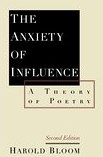Six chapters and boiler plate. On pp. 14-15, Bloom summarizes his
"Six Revisionary Ratios":
| Chapter
| Title
| Thrust
|
| 1
| Clinamen or Poetic Misprison
| "poetic misreading or misprision" [archaically this meant 'misunderstanding';
now it is a legal term for the concealment of a crime, for the misconduct of an official,
or a mistake like a clerical error. JZ].
"A poet swerves from his precursor, by so reading his precursor's poem as to execute
a clinamen in relation to it.
This appears to be a corrective movement in his own poem, which implies that the precursor poem
went accurately up to a certain point, but then should have swerved, precisely in the direction
that the new poem moves."
|
| 2
| Tessera or Completion and Antithesis
| Bloom says he takes the word tessera
"from the ancient mystery cults, where it meant a token of recognition,
the fragment say of a small pot which with the other fragments would
reconstitute the vessel.
A poet antithetically 'completes' his precursor, by so reading the parent poem
as to retain its terms but to mean them in another sense, as though the precursor
had failed to go far enough."
|
| 3
| Kenosis or Repetition and Discontinuity
| Bloom defines kenosis [which is an 'emptying' (from the Greek)
and in particular refers to the action of Christ in putting aside his divinity to be
incarnated] as
"a breaking-device similar to the defense mechanisms our psyches employ against
repetition compulsions; kenosis then is a movement toward discontinuity
with the precursor".
|
| 4
| Daemonization or The Counter-Sublime
| "The later poet opens himself to what he believes to be a power in the parent-poem
that does not belong to the parent proper, but to a range of being just beyond
that precursor. He does this in his own poem, by so stationing its relation to the
parent poem as to generalize away the uniqueness of the earlier work."
|
| 5
| Askesis or Purgation and Solipsism
| For Bloom, askesis is "a movement of self-purgation, which intends the attainment
of a state of solitude; I take the term, general as it is, particularly from the pre-Socratic
shamans like Empedocles. The latter poet does not, as in kenosis,
undergo a revisionary movement of emptying, but of curtailing;
he yields up part of his own human and imaginative endowment, so as to separate
himself from others, including the precursor, and he does this in a poem by so stationing
it in regard to the parent-poem as to make that poem undergo an askesis too;
the precursor's endowment is also truncated."
|
| 6
| Apophrades or The Return of the Dead
| "I take the word from the Athenian dismal or unlucky days upon which the
dead returned to reinhabit the houses in which they had lived. The later poet, in his own
final phase, already burdened by an imaginative solitude that is almost a solipsism,
holds his own poem so open again to the precursor's work that at first we might believe
the wheel has come full circle, and that we are back on the later poet's flooded [sic]
apprenticeship before his strength began to assert itself in the revisionary ratios
[sic].
But the poem is now held open to the precursor, where once it was
open, and the uncanny effect is that the new poem's achievement makes it seem to us,
not as though the precursor were writing it, but as if the later poet himself had
written the precursor's characteristic work."
[This sounds dreadful — the retrospective appropriation of the post-modern!]
[Again on p. 140 with over-reaching ("only") claims:
"But strong poets keep returning from the dead, and only through the
quasi-willing mediumship of other strong poets."
|
 Highlights of Poetry.
Highlights of Poetry.
 Index of poetry.
Index of poetry.
 How to Write Poetry.
How to Write Poetry.
 Books read.
Books read.
 Haibun.
Haibun.
 Haiku.
Haiku.
 Hay(na)ku.
Hay(na)ku.
 Rengay.
Rengay.
 Tanka.
Tanka.
 Concrete.
Concrete.
 Ghazal.
Ghazal.
 Lai.
Lai.
 Pantoum.
Pantoum.
 Prose poem.
Prose poem.
 Rondeau.
Rondeau.
 Rubáiyát.
Rubáiyát.
 Sestina.
Sestina.
 Skaldic verse.
Skaldic verse.
 Sonnet.
Sonnet.
 Terza rima.
Terza rima.
 Triolet.
Triolet.
 Tritina.
Tritina.
 Villanelle.
Villanelle.
 Adam Zagajewski.
Adam Zagajewski.
 Aleda Shirley.
Aleda Shirley.
 Anne Carson.
Anne Carson.
 The Beowulf Poet.
The Beowulf Poet.
 Billy Collins.
Billy Collins.
 Billy Collins exercise.
Billy Collins exercise.
 Snorri's Edda.
Snorri's Edda.
 Carl Dennis.
Carl Dennis.
 Charles Atkinson.
Charles Atkinson.
 Chase Twichell.
Chase Twichell.
 Corey Marks.
Corey Marks.
 François Villon
François Villon
 Franz Wright.
Franz Wright.
 Galway Kinnell.
Galway Kinnell.
 Gary Young.
Gary Young.
 The Gawain Poet.
The Gawain Poet.
 Jack Gilbert.
Jack Gilbert.
 Jane Hirshfield.
Jane Hirshfield.
 Jean Vengua.
Jean Vengua.
 J. Zimmerman.
J. Zimmerman.
 J. Zimmerman (haiku).
J. Zimmerman (haiku).
 J. Zimmerman (tanka).
J. Zimmerman (tanka).
 Jorie Graham.
Jorie Graham.
 Karen Braucher.
Karen Braucher.
 Karl Shapiro.
Karl Shapiro.
 Kay Ryan.
Kay Ryan.
 Britain;
Britain;
 USA.
USA.
 Len Anderson.
Len Anderson.
 Les Murray.
Les Murray.
 Li-Young Lee.
Li-Young Lee.
 Linda Pastan.
Linda Pastan.
 Louise Glück.
Louise Glück.
 Nordic Skalds.
Nordic Skalds.
 Pulitzer Poetry Prize (U.S.A).
Pulitzer Poetry Prize (U.S.A).
 Rainer Maria Rilke.
Rainer Maria Rilke.
 Richard Hugo.
Richard Hugo.
 Robert Bly.
Robert Bly.
 Sara Teasdale.
Sara Teasdale.
 Shiki (haiku).
Shiki (haiku).
 Snorri's Edda.
Snorri's Edda.
 Stephen Dunn.
Stephen Dunn.
 Ted Kooser.
Ted Kooser.
 W.S. Merwin.
W.S. Merwin.

